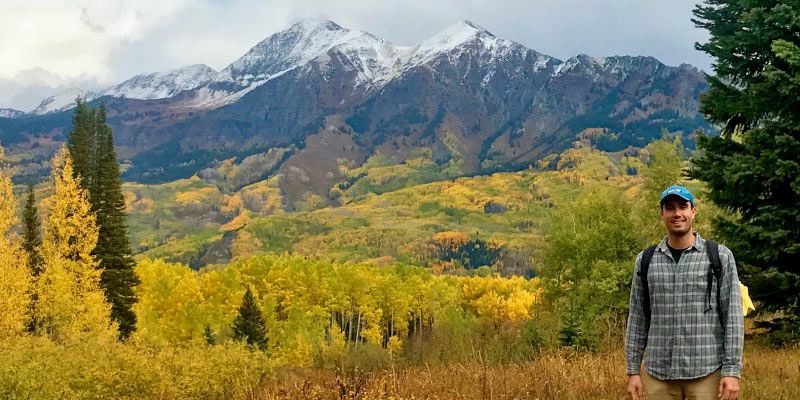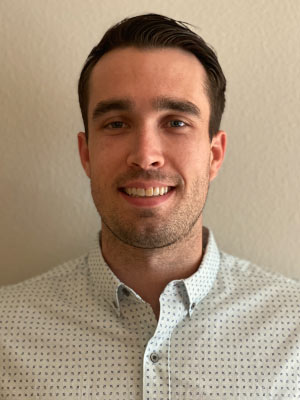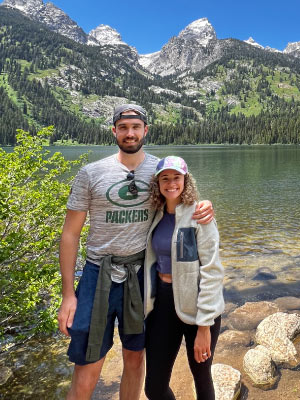
Ford Freyberg is starting a new chapter of his life. Recently married, he began a new job in October and will be moving out west early next year to live in the mountains that he and his wife love being around. “We’re big mountain people,” Freyberg said.
This all comes after graduating in August from the environmental observation and informatics (EOI) graduate program, a 15-month master of science degree. This professional-focused program offers students an education in environmental conservation, remote sensing, geographic information systems, and informatics.
Originally from Madison, Freyberg stayed in his hometown to attend the UW where he graduated with a double major in biochemistry and Spanish. He then spent the next six years working at Epic, a medical software company located in Verona, Wisconsin, but found himself wanting to work in another field. He liked certain aspects of working in the software industry but wasn’t a fan of the medical setting. He didn’t want to give up the fast pace or the ability to develop helpful products and tools. That’s when he found the Nelson Institute’s EOI program.
“I randomly stumbled across this semi-new offering from UW–Madison called environmental observation and informatics, which really lured me in with some of the pretty pictures. They showed these aerial views of Lake Mendota, which is what drew me in,” Freyberg said. “I started looking into what the purpose of these beautiful images was, and it was this cool confluence of capturing the images and the computer algorithms that go into making the images useful, in addition to being pretty.”

Freyberg enrolled in the program and began an in-depth curriculum that allowed him to focus on his own interests. Two professors stood out: Annemarie Schneider and Mutlu Özdoğan, whose flexibility and openness allowed Freyberg to create end-of-semester projects on topics that he was passionate about. This included a literature review paper that looked at the computer algorithms used to monitor wildfire risk.
“I was the only one in the class that wrote that particular paper, because that’s what was particularly interesting to me,” Freyberg said. “On top of that, both [Schneider and Özdoğan] are just really interesting, fast-paced, and smart professors.”
Freyberg encourages prospective EOI students to envision themselves in the EOI career of their dreams. “There are a million good reasons for why to enroll, but try to have a plan for what you want to do with the information you’re going to learn in EOI, and then put that to practice in your summer capstone project.”
EOI students spend their final summer semester working on a hands-on project they develop in collaboration with a partner organization. Freyberg praises the hard work of the Nelson Institute professional program staff, Sarah Graves, Nathan Schulfer, and Meghan Kautzer, who helped shape his own capstone project. “Nobody could do the program without them,” Freyberg said. “They put together an excellent program and continue to run it really well.”
Freyberg’s final EOI summer term led him to Pocatello, Idaho, where he interned with NASA DEVELOP, a program that cultivates Earth observation users and leaders by working with communities and organizations to address environmental and policy concerns. There, Freyberg worked on a project using geospatial research to assess wildfire risk in Idaho.
Freyberg led the project with three other interns from various backgrounds. The team conducted research then downloaded, transformed, and incorporated the information into a model that predicts drought-intensified wildfires. “That was a fun and interesting project — to be able to present something like that to folks who are the experts in the field,” Freyberg said.

After the project ended, Freyberg returned to Madison, graduated from the EOI program, and got married. In October, he began working for the Vexcel Data Program, a subsidiary of Vexcel Imaging, a high-quality camera manufacturer for drones and airplanes. The company is rolling out a new program that offers high-quality imagery for an annual subscription. “It’s like the Netflix of remotely sensed imagery,” Freyberg explained.
He works as a product manager where he assesses the market and communicates with Vexcel’s development team to make sure the company is developing the right type of product. “It’s similar in many ways to the role I had at Epic, but in a new industry, which I like a lot better,” he said.
Freyberg and his wife will be moving to Denver early next year, closer to the mountains that they love, where he will be able to continue his work with the beautiful pictures that brought him into his new industry.
Learn more about the environmental observation and informatics MS and how you can support the program.